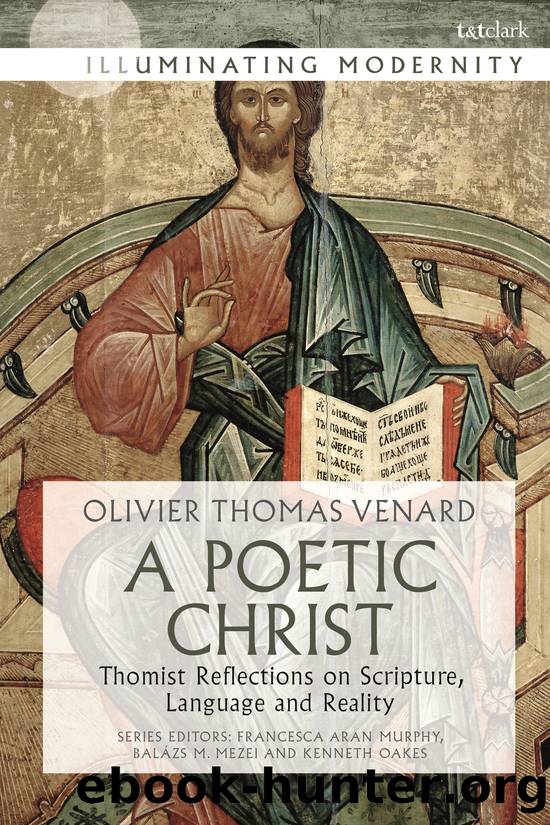A Poetic Christ by Olivier-Thomas Venard;

Author:Olivier-Thomas Venard;
Language: eng
Format: epub
ISBN: 9780567684721
Publisher: Bloomsbury UK
Chapter 9
A Thomist Response: The Metaphysics of the Word
In his famous essay on the origin of language, Louis de Bonald writes, ‘The whole question of language is perhaps reducible to this carefully considered proposition: “that a person thinks their speech before speaking their thought”, or otherwise said, “a person cannot speak their thought without thinking their speech.”’1 We will return to the Vicomte’s reflections on the origin of language in the subsequent chapter and for now examine how for St. Thomas the primary issue at stake in reflection on the mental word was not philosophical but theological. We will begin by discussing Thomas’s understanding of the mental word as it forms the necessary context for understanding the development of his thought on the word.
The Theological Occasion of the Discovery of the Mental Word
In the general epistemology of sacra doctrina, theology is never far from Thomas’s ‘philosophical’ considerations, such as those which deal with the cognitive sciences under discussion here or with metaphysics itself. Thomas commented on Holy Scripture each morning and so he was provided with ample theological opportunities for philosophical reflection. More particularly, Paissac notes that ‘in order to show the reality of relations in God, Thomas will undertake an examination of the mental word’.2 Since the noun ‘word’ in revelation designates a divine Person, especially in the Gospel of John from its very first verse, it should first of all designate a created reality which possesses two relative characteristics.
God is triune. In the eternal subsistence of his unique nature, he is, in the consubstantiality of the persons, the eternal and necessary communication of the divine nature of the Father to the Son by the procession of generation, and from the Father and the Son to the Holy Spirit by the procession of spiration. These inner-Trinitarian processions cannot be of a transitive order of local movement or exercised efficiency – as happens in the physical world – but must be conceived according to the immanent mode of intelligible emanation. Immanent action as actio perfecti, which involves procession by way of intelligible emanation, is alone capable of offering an account of the distinction of persons which can only be conceived by a relative opposition of origin. Hence the relations which find their basis in the immanent action proper to a spiritual nature, in the measure to which the spiritual realities are the only ones which allow a role for analogy, are the relations proper to intellection and willing. Thus there can only be two divine processions ad intra, that of the Word and that of Love. While in his commentary on the Sentences Saint Thomas held to the idea of ‘Son’ by reason of its essential relativity as ‘word’ was not yet being clearly distinguished by species and recognized in its relative being, in the Summa theologiae he no longer hesitates to claim: ‘In God, the appellation of word properly said is understood in a personal sense; it is the proper name of the person of the Son.’3
There can only
Download
This site does not store any files on its server. We only index and link to content provided by other sites. Please contact the content providers to delete copyright contents if any and email us, we'll remove relevant links or contents immediately.
Resisting Happiness by Matthew Kelly(3197)
The Social Psychology of Inequality by Unknown(2770)
Designing Your Life by Bill Burnett(2605)
Day by Elie Wiesel(2596)
The Giving Tree by Shel Silverstein(2174)
Angels of God: The Bible, the Church and the Heavenly Hosts by Mike Aquilina(1870)
Human Design by Chetan Parkyn(1859)
The Supreme Gift by Paulo Coelho(1799)
Jesus of Nazareth by Joseph Ratzinger(1709)
Augustine: Conversions to Confessions by Robin Lane Fox(1688)
Hostage to the Devil by Malachi Martin(1676)
7 Secrets of Divine Mercy by Vinny Flynn(1620)
Dark Mysteries of the Vatican by H. Paul Jeffers(1607)
The Vatican Pimpernel by Brian Fleming(1588)
St. Thomas Aquinas by G. K. Chesterton(1557)
Saints & Angels by Doreen Virtue(1530)
The Ratline by Philippe Sands(1425)
My Daily Catholic Bible, NABRE by Thigpen Edited by Dr. Paul(1418)
Called to Life by Jacques Philippe(1410)
